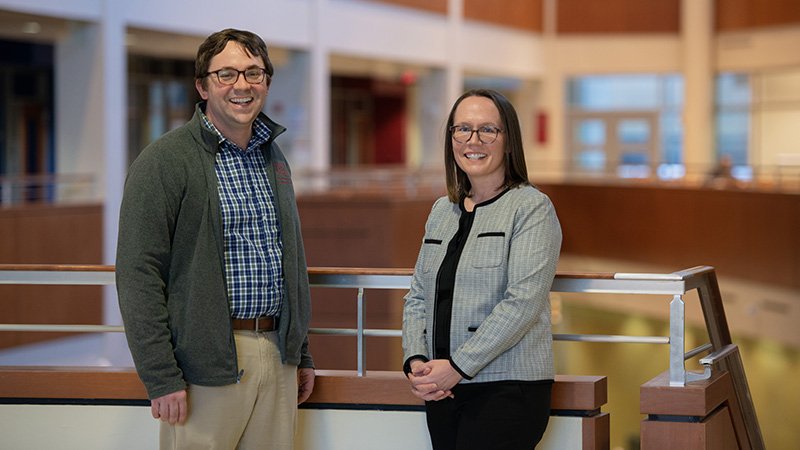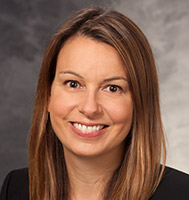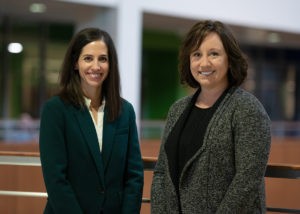
It started in 2020 as a strategy to work within the many restrictions required by the COVID-19 pandemic and still allow connection and communication among members of the Department of Pediatrics Division of General Pediatrics and Adolescent Medicine. Today, the Assistant Professor Promotion Cohort Program continues across all divisions with a more comprehensive mission. It helps assistant professors acclimate to the department and learn together what it means to be an assistant professor in the Department of Pediatrics. It also encourages members to connect with peers, share their challenges and successes, and clarify their steps forward in their careers in pediatrics.
Douglas Dean III, PhD, assistant professor, Division of Neonatology and Newborn Nursery, and a research scientist on the tenure track, has gleaned many benefits from the program’s offerings. “Not only has it been helpful to learn about many of the available supports and resources in the department, but it has also been an amazing opportunity to connect with other assistant professors and learn from one another,” he said. “The valuable information and discussions around organization, productivity, and work-life balance have greatly helped me in my own work.”
Another participant in the cohort program, Catherine Allen, MD, assistant professor on the Clinical Health Sciences (CHS) track in the Division of Cardiology, emphasized the program’s advantages around promotion. “My participation in the cohort program has benefited me by allowing me to be part of a group dialogue regarding promotion with several members of the promotion team who have been able to help explain the steps in the process,” Allen said. “Also, hearing input from other current assistant professors and recently promoted colleagues has been helpful in my thinking about my own promotion packet.”

Margaret Greco, MD, assistant professor, Division of Cardiology, is on the Clinician Teacher (CT) track. She noted the program’s usefulness in making connections. “It is helpful to speak with other physicians who have similar issues,” she said.
The initial “COVID Cohorts” program was the idea of then-chief of the Division of General Pediatrics and Adolescent Medicine, Megan Moreno, MD, MSEd, MPH, now interim chair of the department and vice chair of academic affairs since 2021. The program created small groups of faculty to meet and discuss strategies for academic work and productivity, as well as social connection and work-life balance within the strictures of the new pandemic reality. The groups’ evaluations of this pilot effort showed that it was helpful to learn in groups, hear each other’s questions, and learn about resources one may have not encountered before.
The success of the pilot program prompted the program’s expansion across all divisions in the fall of 2021. With suggestions from the newly formed Promotion Oversight and Advisory Committee and from division chiefs, the department’s academic affairs team assumed leadership and support for this new model. The goals of the Assistant Professor Promotion Cohort Program were determined to provide the following:
- Education and strategies toward academic promotion in the Department of Pediatrics
- Social connection and support across assistant professors in the department
- Useful and practical skillsets relevant to early career pediatricians to make work efficient and productive

Associate director of academic affairs, Kristin Determan, and faculty promotions specialist, Katie Denzin, assign new faculty members to cohorts when they begin their appointment. There are five cohorts with six to 12 faculty members in each group. Three to four cohort meetings are scheduled throughout the year. Efforts are made to organize faculty members into groups based on their faculty track and number of years on the faculty.
Inclusion in a group and participation in the Assistant Professor Promotion Cohort Program is completely voluntary. Most new assistant professors opt to join a cohort and attend the program’s offerings. Through 2021 and 2022, presentations and discussions included such topics as resources for promotion, how to collect and organize information for promotion, how to make the most of the annual review, and a guest panel of recently promoted faculty. Upcoming topics for 2023 include education as a pathway to promotion and strategies for developing a regional reputation.
This year, the program will see even more changes with the introduction of nine new co-leaders, most of whom also serve on the department’s Promotion Oversight and Advisory Committee. “After we put out a call for faculty members who would be willing to assist with the program, the response was quick and generous,” Determan explained. “We are extremely grateful to have a committed and experienced group of new co-leaders for the 2023 program.”
These are the new co-leaders of the Assistant Professor Promotion Cohort Program:
- Vivek Balasubramaniam, MD, associate professor, Division of Pulmonology and Sleep Medicine
- Nicole Baumann-Blackmore, MD, associate professor, Division of Neonatology and Newborn Nursery
- David Bernhardt, MD, professor, Division of General Pediatrics and Adolescent Medicine
- Bernadette Gillick, PhD, MSPT, PT, associate professor, Division of Developmental Pediatrics and Rehabilitation Medicine
- Matthew Harer, MD, associate professor, Division of Neonatology and Newborn Nursery
- Daniel Jackson, MD, professor, Division of Allergy, Immunology, and Rheumatology
- Pamela Kling, MD, professor, Division of Neonatology and Newborn Nursery
- Kirstin Nackers, MD, associate professor, Division of Hospital Medicine
- Christine Zimmerman, MD, associate professor, Division of General Pediatrics and Adolescent Medicine
“The co-leaders will be present at the meetings and will offer their personal mentorship, help determine the meeting contents, and determine who will be invited for panel discussions,” Determan explained. “Their time and engaged leadership are deeply appreciated.”
While the program has evolved to primarily focus on navigating the complexities of the system for new assistant professors, Determan noted it still reflects Moreno’s initial vision to provide connection and resources for a path to success. “One thing that has been important to Dr. Moreno is to learn how we can find ways to make people’s work enjoyable, how we can help them to thrive,” she added.
For those who would like to know more about the program, please contact Kristin Determan or Katie Denzin.